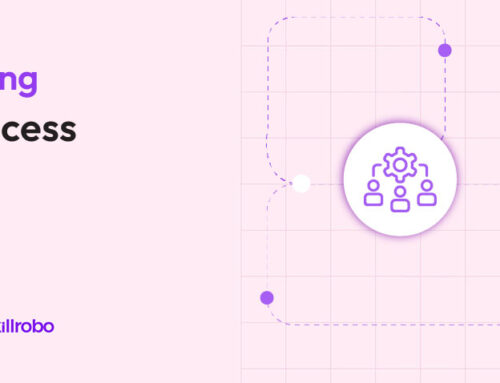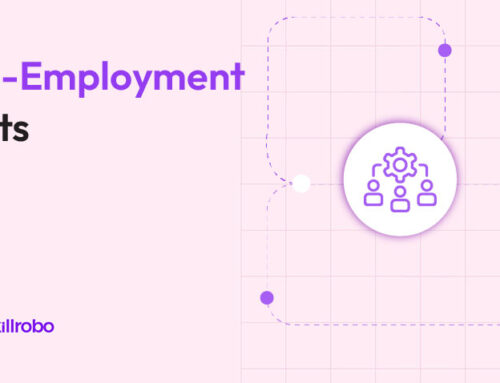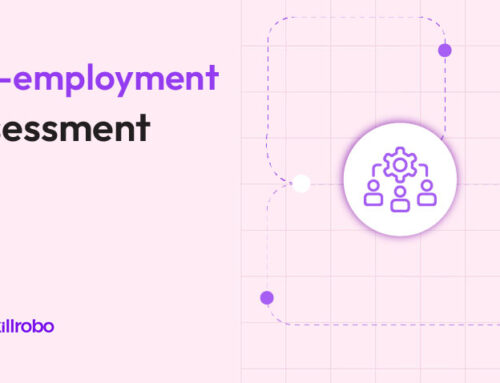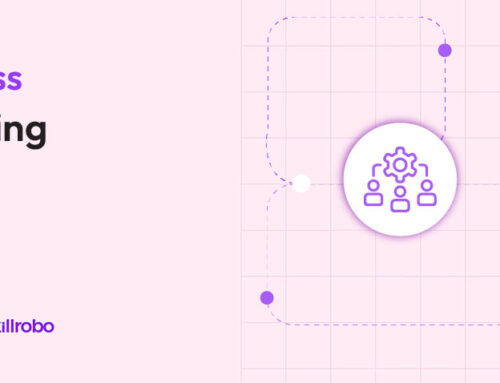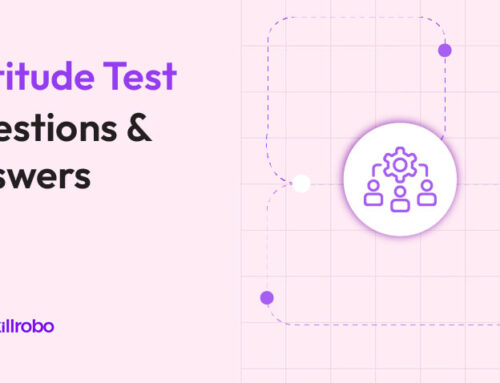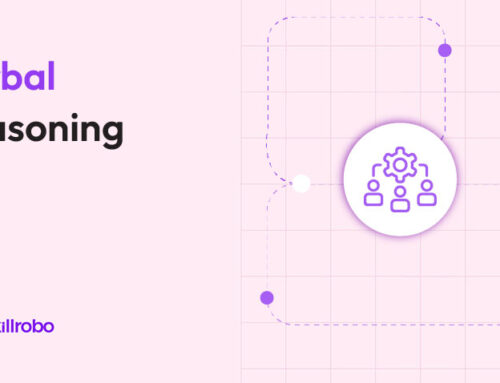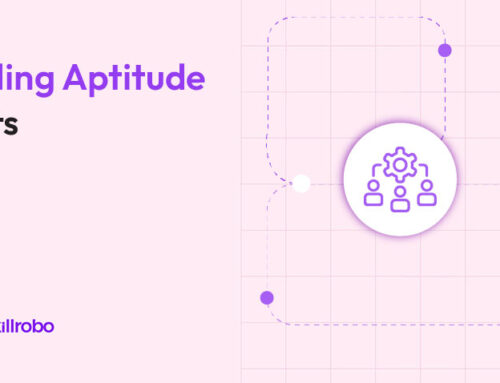Table of Contents
Related articles

Pre-employment evaluations are essential in today’s competitive job market for making wise hiring decisions and swiftly onboarding the best candidate for a role. Finding the right candidate who possesses all the necessary pre-employment testing and integrates well into your company’s culture is like finding a needle in the haystack.
These assessments are used by recruiters since they provide them with valuable information about the skills and personality attributes of potential hires, enabling their companies to fill positions more quickly while ensuring high-quality hiring each time.
Pre-employment tests help you avoid employing someone who won’t live up to companies expectations, which forces you to start the hiring process all over again. Without them, recruiting is like playing a game of luck. Recruiters use these tests to determine a candidate’s skills accurately, which helps them identify qualified candidates faster.
Definition of Pre-Employment Tests
Pre-employment testing is a series of several employment test tools recruiters use to screen potential candidates and identify the best among them for their organization.
These strategic tests not only help to streamline the recruitment process but also establish solid criteria for future selection processes, making it easier to identify suitable candidates for roles that might come up later.
Types of Pre-employment Tests
Aptitude Test
Aptitude tests are standardized pre-employment tests that help recruiters to evaluate an individual’s suitability for a specific role. Employers can learn a lot about candidates using these tools, including their strengths and limitations, and how they could approach the problems of the position they have applied for. Typically, aptitude assessments take place online using a specialized web-based platform that enables large-scale virtual testing. These scientifically created tests made it incredibly simple to evaluate each person’s professional aptitude and identify applicants who were performance-driven and objective.
Psychometric Test
Psychometric tests are psychological analysis tools to evaluate a candidate’s aptitude, personality traits, talents, and cognitive levels in an unbiased manner. The recruitment process and employee development both substantially utilize these assessments. The psychometric exam can assist in matching a person’s personality and abilities to a specific role or career. These exams can be used to narrow down a big application pool to a small group of candidates who would be the best fit for a particular post or company during large-scale pre-employment testing efforts.
Job Knowledge Test
Job knowledge tests are used to evaluate a candidate’s level of expertise in their profession. Job knowledge tests are beneficial for assessing a candidate’s expertise in their chosen fields with both theoretical and practical knowledge. This test assists in determining a candidate’s functional abilities, aptitude, technical skills, and proficiency in a variety of domain skills tests, including evaluations of leadership, accounting, and finance, among others.
Personality Test
Although personality assessments are not intended to predict work performance, they are very useful in figuring out whether a candidate would fit in with the team or how they will act in a certain situation. Personality assessments measure qualities including adaptability, work ethic, ambition, and receptivity to criticism.
Some companies hire personality tests to cull out applicants who exhibit undesirable qualities like narcissism or rigidity.
Integrity Test
Integrity tests can be performed for any position, but they are especially helpful when filling a position of trust. Integrity tests are frequently required for hiring people who manage money, handle sensitive data, work in the medical field, or have the potential to perpetrate fraud.
These pre-employment testing can lessen the possibility of placing the “wrong” kind of person in a position of trust, but they are not a foolproof safeguard against theft, fraud, and other risky activity. Integrity testing should be used in conjunction with other screening techniques, including audits, police (criminal record) checks, and workplace regulations and procedures.
Cognitive Ability Test
IQ tests are typically not used in the workplace to evaluate applicants’ intelligence. Instead, they assess candidates’ mental aptitude, and their capacity for problem-solving and learning using cognitive ability or cognitive aptitude exams.
This is accomplished using a variety of tests, including those for spatial awareness, verbal, abstract, and numerical thinking, problem-solving, mathematical prowess, and memory. Applicants can anticipate working on tasks that require them to complete number sequences, rearrange shapes, and more.
Benefits of Pre-Employment Test
Pre-employment tests are a vital tool for recruiting experts since they provide many advantages that help you save time and money. Pre-employment tests have become a popular tool used by recruiters to ensure that they choose the best candidates for each position. These tests offer them additional advantages and benefits while hiring personnel for top open positions, in addition to ultimately saving them money.
- Pre-employment testing has several notable advantages, one of which is improved recruitment efficiency. Recruiters may learn a lot about several job candidates with the aid of the proper screening software in a lot less time than it takes to manually go through resumes.
- This test supports employers in selecting applicants who are most suitable for the position and the company. This results in a substantially higher overall quality of recruitment.
- Professionally designed, extensively verified pre-employment tests can accurately determine employee productivity across a wide range of job types and industries. These tests are the most accurate methods of predicting performance because the recruiter may unbiasedly ascertain the level to which a candidate possesses the knowledge, skills, and talents to function successfully in any given role.
- Recruiters must discover solutions to reduce unconscious bias, which is a significant issue in the hiring process. Pre-employment screening reduces hiring discrimination by focusing on candidates’ relevant talents and personality attributes rather than just their history or demographic.
- Pre-employment testing can boost the objectivity, equity, and legal defensibility of an organization’s hiring process in addition to aiding in the improvement of various business outcomes. Pre-employment testing must adhere to regulations that guarantee fair and non-discriminatory hiring processes. Employment testing can assist legal justifiability in this way by boosting the objectivity of a company’s recruitment procedures.
- Employers face an expensive issue with turnover and are constantly looking for solutions to reduce it and keep their best employees on board. Hiring individuals who are a real fit for the position and the company is the best approach to reducing employee turnover, and here is where pre-employment tests may be extremely helpful.
Conclusion
There are numerous qualified candidates out there that have the appropriate certification, qualifications, and skills. So, you need methods to assess them impartially to decide if they are the exact match for a role.
Pre-employment testing has to be used to find individuals who are a great fit for a position, possessing both personality and behavior traits as well as job-related abilities and expertise.
For the aforementioned reasons, it is recommended that you make use of a reputable hiring and skills-testing platform like Skillrobo.Your team can swiftly find and shortlist suitable applicants with the help of the Skillrobo all-in-one skills assessment platform.
If you are looking for a well-built pre-employment assessment tool that gives you a head start in transforming the recruitment process, sign up for our free trial!

Pre-employment evaluations are essential in today’s competitive job market for making wise hiring decisions and swiftly onboarding the best candidate for a role. Finding the right candidate who possesses all the necessary pre-employment testing and integrates well into your company’s culture is like finding a needle in the haystack.
These assessments are used by recruiters since they provide them with valuable information about the skills and personality attributes of potential hires, enabling their companies to fill positions more quickly while ensuring high-quality hiring each time.
Pre-employment tests help you avoid employing someone who won’t live up to companies expectations, which forces you to start the hiring process all over again. Without them, recruiting is like playing a game of luck. Recruiters use these tests to determine a candidate’s skills accurately, which helps them identify qualified candidates faster.
Definition of Pre-Employment Tests
Pre-employment testing is a series of several employment test tools recruiters use to screen potential candidates and identify the best among them for their organization.
These strategic tests not only help to streamline the recruitment process but also establish solid criteria for future selection processes, making it easier to identify suitable candidates for roles that might come up later.
Types of Pre-employment Tests
Aptitude Test
Aptitude tests are standardized pre-employment tests that help recruiters to evaluate an individual’s suitability for a specific role. Employers can learn a lot about candidates using these tools, including their strengths and limitations, and how they could approach the problems of the position they have applied for. Typically, aptitude assessments take place online using a specialized web-based platform that enables large-scale virtual testing. These scientifically created tests made it incredibly simple to evaluate each person’s professional aptitude and identify applicants who were performance-driven and objective.
Psychometric Test
Psychometric tests are psychological analysis tools to evaluate a candidate’s aptitude, personality traits, talents, and cognitive levels in an unbiased manner. The recruitment process and employee development both substantially utilize these assessments. The psychometric exam can assist in matching a person’s personality and abilities to a specific role or career. These exams can be used to narrow down a big application pool to a small group of candidates who would be the best fit for a particular post or company during large-scale pre-employment testing efforts.
Job Knowledge Test
Job knowledge tests are used to evaluate a candidate’s level of expertise in their profession. Job knowledge tests are beneficial for assessing a candidate’s expertise in their chosen fields with both theoretical and practical knowledge. This test assists in determining a candidate’s functional abilities, aptitude, technical skills, and proficiency in a variety of domain skills tests, including evaluations of leadership, accounting, and finance, among others.
Personality Test
Although personality assessments are not intended to predict work performance, they are very useful in figuring out whether a candidate would fit in with the team or how they will act in a certain situation. Personality assessments measure qualities including adaptability, work ethic, ambition, and receptivity to criticism.
Some companies hire personality tests to cull out applicants who exhibit undesirable qualities like narcissism or rigidity.
Integrity Test
Integrity tests can be performed for any position, but they are especially helpful when filling a position of trust. Integrity tests are frequently required for hiring people who manage money, handle sensitive data, work in the medical field, or have the potential to perpetrate fraud.
These pre-employment testing can lessen the possibility of placing the “wrong” kind of person in a position of trust, but they are not a foolproof safeguard against theft, fraud, and other risky activity. Integrity testing should be used in conjunction with other screening techniques, including audits, police (criminal record) checks, and workplace regulations and procedures.
Cognitive Ability Test
IQ tests are typically not used in the workplace to evaluate applicants’ intelligence. Instead, they assess candidates’ mental aptitude, and their capacity for problem-solving and learning using cognitive ability or cognitive aptitude exams.
This is accomplished using a variety of tests, including those for spatial awareness, verbal, abstract, and numerical thinking, problem-solving, mathematical prowess, and memory. Applicants can anticipate working on tasks that require them to complete number sequences, rearrange shapes, and more.
Benefits of Pre-Employment Test
Pre-employment tests are a vital tool for recruiting experts since they provide many advantages that help you save time and money. Pre-employment tests have become a popular tool used by recruiters to ensure that they choose the best candidates for each position. These tests offer them additional advantages and benefits while hiring personnel for top open positions, in addition to ultimately saving them money.
- Pre-employment testing has several notable advantages, one of which is improved recruitment efficiency. Recruiters may learn a lot about several job candidates with the aid of the proper screening software in a lot less time than it takes to manually go through resumes.
- This test supports employers in selecting applicants who are most suitable for the position and the company. This results in a substantially higher overall quality of recruitment.
- Professionally designed, extensively verified pre-employment tests can accurately determine employee productivity across a wide range of job types and industries. These tests are the most accurate methods of predicting performance because the recruiter may unbiasedly ascertain the level to which a candidate possesses the knowledge, skills, and talents to function successfully in any given role.
- Recruiters must discover solutions to reduce unconscious bias, which is a significant issue in the hiring process. Pre-employment screening reduces hiring discrimination by focusing on candidates’ relevant talents and personality attributes rather than just their history or demographic.
- Pre-employment testing can boost the objectivity, equity, and legal defensibility of an organization’s hiring process in addition to aiding in the improvement of various business outcomes. Pre-employment testing must adhere to regulations that guarantee fair and non-discriminatory hiring processes. Employment testing can assist legal justifiability in this way by boosting the objectivity of a company’s recruitment procedures.
- Employers face an expensive issue with turnover and are constantly looking for solutions to reduce it and keep their best employees on board. Hiring individuals who are a real fit for the position and the company is the best approach to reducing employee turnover, and here is where pre-employment tests may be extremely helpful.
Conclusion
There are numerous qualified candidates out there that have the appropriate certification, qualifications, and skills. So, you need methods to assess them impartially to decide if they are the exact match for a role.
Pre-employment testing has to be used to find individuals who are a great fit for a position, possessing both personality and behavior traits as well as job-related abilities and expertise.
For the aforementioned reasons, it is recommended that you make use of a reputable hiring and skills-testing platform like Skillrobo.Your team can swiftly find and shortlist suitable applicants with the help of the Skillrobo all-in-one skills assessment platform.
If you are looking for a well-built pre-employment assessment tool that gives you a head start in transforming the recruitment process, sign up for our free trial!

